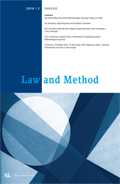|
This paper starts by reviewing empirical research that threatens law and economics’ initial success. This research has demonstrated that the functioning of the law cannot be well understood based on the assumption of the rational actor and that policies which are based on this assumption are likely to be flawed. Subsequently, three responses to this criticism are discussed. Whereas the first response denounces this criticism by maintaining that the limitations attributed to the rational actor can easily be incorporated in rational choice theory, the second response welcomes the criticism as an opportunity to come up with an integrative theory of law and behavior. The third response also takes the criticism seriously but replaces the aspiration to come up with such an integrative theory by a context-sensitive approach. It will be argued that the first two responses fall short while the third response offers a promising way to go forward. |

| Artikel |
|
| Authors | Peter Mascini |
| AbstractAuthor's information |
| Artikel |
|
| Authors | Simone Schroff |
| AbstractAuthor's information |
|
Different legal rules can lead to the same observable outcome, making it difficult to identify the most influential rule. This article addresses this gap by focusing on how competing explanatory theories derived from a doctrinal analysis can be assessed using a methodology called process-tracing. One of process-tracing’s main uses is to link explanatory theories to empirical evidence, permitting an assessment of causal mechanisms’ practical impact in comparison to each other. This article demonstrates the potential and practical implementation of process-tracing in the context of empirical legal research. In addition to the core characteristics of process-tracing, the paper clarifies when process-tracing can add to a doctrinal analysis and the requirements which have to be met. Furthermore, the process of linking doctrinal work with empirical evidence relying on process-tracing is shown, using the example of copyright ownership in the broadcasting sector. As a result, this paper demonstrates the added value of a process-tracing analysis carried out in addition to doctrinal work, in particular the insights into industry practice it generates. |


